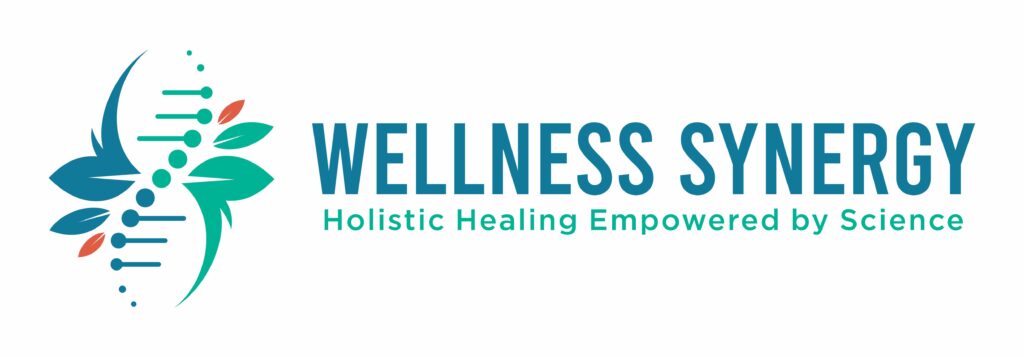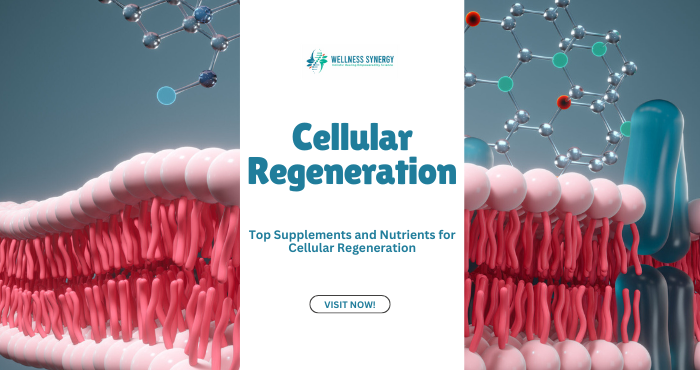Top Supplements and Nutrients That Support Cellular Regeneration
Cellular regeneration is the body’s natural process of repairing and renewing damaged cells, tissues, and organs. As we age or face injury, our cells gradually lose their ability to regenerate efficiently. However, certain supplements and nutrients can support this vital process, helping the body rejuvenate and maintain overall health. In this blog, we’ll dive into the top supplements and nutrients that aid cellular regeneration, explaining how each contributes to healthier, younger, and more resilient cells.
What is Cellular Regeneration?
Cellular regeneration refers to the body’s ability to replace damaged or dead cells with new, healthy ones. It is a crucial process for maintaining tissue function and overall health. When cellular regeneration slows down, it can contribute to aging, degenerative diseases, and a weakened immune system.

For effective cellular regeneration, the body needs a balance of specific nutrients, proteins, vitamins, and minerals that enhance cell repair, reduce inflammation, and stimulate the production of new cells.
Why is Cellular Regeneration Important?
Cellular regeneration is important for more than maintaining youthful skin or energy levels. It plays a fundamental role in repairing organs, tissues, muscles, and bones. However, cellular regeneration naturally declines as we age, leading to various signs of aging, such as wrinkles, joint pain, muscle loss, and cognitive decline.
The right nutrients can support this process, slow aging, reduce inflammation and enhance tissue repair. This is why it’s essential to prioritize nutrients that assist in cellular regeneration.
Top Supplements and Nutrients for Cellular Regeneration
1. Collagen
Collagen is the most abundant protein in the body and is a key structural component of the skin, muscles, bones, and connective tissues. As we age, collagen production naturally decreases, leading to the appearance of wrinkles, sagging skin, and weakened joints.
Supplementing with collagen, particularly hydrolyzed collagen peptides, can promote cellular regeneration by supporting collagen and elastin production in the skin. This can help improve skin elasticity, reduce wrinkles, and support joint health. Collagen peptides have been shown to stimulate cartilage regeneration in joints, potentially reducing the risk of osteoarthritis and improving mobility.
There are also plant-based options to build collagen, which include hyaluronic acid, silica, and other collagen-promoting nutrients.
How it helps cellular regeneration:
- Stimulates collagen and elastin production.
- Improves skin elasticity and hydration.
- Supports joint health and cartilage regeneration.
2. Vitamin C
Vitamin C is a potent antioxidant that is critical in collagen synthesis. It helps protect cells from oxidative stress and supports the regeneration of tissues and skin. By neutralizing free radicals, vitamin C prevents cellular damage and supports the growth of new, healthy cells.
In addition to its role in collagen production, vitamin C is essential for wound healing and immune function. The antioxidant properties of vitamin C also help reduce inflammation, a significant barrier to cellular regeneration.
How it helps cellular regeneration:
- Promotes collagen synthesis.
- Protects cells from oxidative stress and free radical damage.
- Supports immune function and wound healing.
3. Omega-3 Fatty Acids
Omega-3 fatty acids, found in fish oil and algae supplements, are known for their anti-inflammatory properties. Chronic inflammation is one of the primary causes of impaired cellular regeneration, which can lead to conditions like arthritis, cardiovascular disease, and even cognitive decline.
Omega-3s support cellular regeneration by reducing inflammation and promoting the repair of damaged cells. They also help form new cell membranes essential for healthy cell function and regeneration.
How it helps cellular regeneration:
- Reduces chronic inflammation.
- Promotes healthy cell membrane formation.
- It supports brain health and reduces cognitive decline.
4. Curcumin (Turmeric Extract)
Curcumin is the active compound in turmeric, and it has been widely studied for its anti-inflammatory and antioxidant properties. It reduces oxidative stress and inflammation, which can hinder cellular regeneration. Curcumin has been shown to activate the body’s natural repair mechanisms, encouraging the regeneration of cells and tissues.
In addition, curcumin has neuroprotective effects, supporting brain health and reducing the risk of neurodegenerative diseases like Alzheimer’s. It also helps with joint health, making it an excellent supplement for regenerating cartilage and relieving joint pain.
How it helps cellular regeneration:
- Reduces inflammation and oxidative stress.
- Promotes tissue and joint regeneration.
- Supports brain health and cognitive function.
5. Vitamin D
Vitamin D is crucial for bone health and helps repair damaged tissues. It helps regulate cell growth, differentiation, and apoptosis (programmed cell death), essential cellular regeneration processes. Vitamin D also enhances the function of stem cells, which are responsible for regenerating tissues throughout the body.
Adequate vitamin D levels can support cellular regeneration by stimulating the repair of bones, muscles, and skin. It also strengthens the immune system, reducing the risk of infections and promoting faster recovery from injury.
How it helps cellular regeneration:
- Supports bone and muscle regeneration.
- Regulates cell growth and differentiation.
- Enhances immune function and tissue repair.
6. Coenzyme Q10 (CoQ10)
Coenzyme Q10, or CoQ10, is a powerful antioxidant that helps protect cells from oxidative damage. It also plays a key role in producing energy within cells by supporting the mitochondria, the powerhouses of our cells. CoQ10 levels naturally decline as we age, resulting in reduced cellular function and slower regeneration.
Supplementing with CoQ10 can help improve mitochondrial function, increase cellular energy, and promote faster tissue regeneration. It is especially beneficial for the skin, as it reduces the appearance of wrinkles and improves skin texture.
How it helps cellular regeneration:
- Increases mitochondrial function and energy production.
- Protects cells from oxidative stress.
- It supports skin health and reduces aging signs.
7. Zinc
Zinc is an essential mineral that supports the immune system, tissue repair, and protein synthesis. It also plays a vital role in cellular regeneration by stimulating the growth of new cells and supporting wound healing. Zinc helps synthesize DNA and RNA required to produce new cells.
In addition to its regenerative properties, zinc has been shown to have anti-inflammatory effects. It is essential for maintaining skin, eyes, and immune system health.
How it helps cellular regeneration:
- Stimulates cell growth and tissue repair.
- Supports DNA and RNA synthesis.
- Enhances immune function and wound healing.
8. Astaxanthin
Astaxanthin is a powerful antioxidant found in certain algae and seafood. It has been shown to have potent anti-inflammatory properties and supports skin health by reducing oxidative damage caused by UV radiation and environmental pollutants.
Astaxanthin also helps improve mitochondrial function, promoting cellular energy production and regeneration. Thus, it is an excellent supplement for those looking to enhance cellular regeneration, reduce the signs of aging, and improve skin tone and elasticity.
How it helps cellular regeneration:
- Reduces oxidative stress and inflammation.
- Enhances mitochondrial function and energy production.
- It supports skin health and reduces aging signs.
Conclusion
Cellular regeneration is an ongoing process essential for maintaining overall holistic health healing. As we age, supporting the body’s ability to regenerate cells becomes even more crucial. By incorporating the right supplements and nutrients, such as collagen, vitamin C, omega-3 fatty acids, and curcumin, we can help our bodies regenerate tissues more efficiently, reduce inflammation, and slow aging.
It’s important to remember that supplements should be part of a well-rounded approach that includes a healthy diet, regular exercise, and proper sleep. Before starting any supplementation routine, it’s advisable to consult with a healthcare provider, especially if you have underlying health conditions or are taking medications.
At Wellness Synergy, we emphasize supporting cellular regeneration through personalized wellness strategies and proper nutrition. By doing so, we empower individuals to enhance their bodies’ natural ability to repair and renew, leading to healthier and more vibrant lives.
Disclaimer:
Wellness Synergy, its products, and Dr. Ilka Tamar do not intend to cure, treat, heal, or prevent diseases or illnesses. These statements have not been evaluated by the Food and Drug Administration. The information on our social media and website is for informational purposes only and is not a substitute for medical advice or diagnosis from your physician or other healthcare professional. This information is meant for general wellness purposes and does not claim to diagnose, treat, or cure any illness or health condition. If you suspect you have a medical issue, please contact your physician or healthcare provider.


